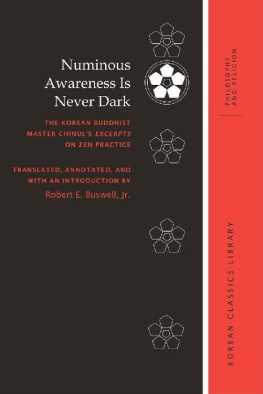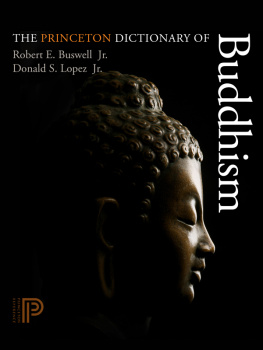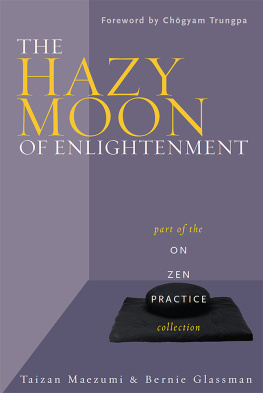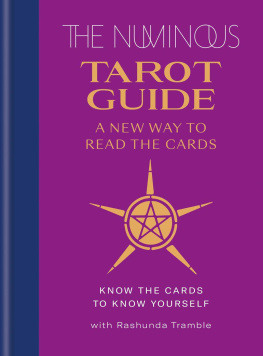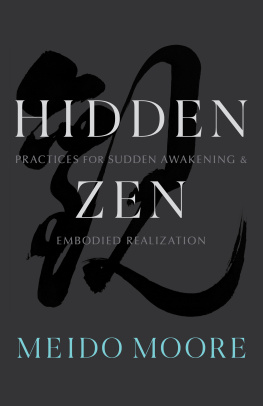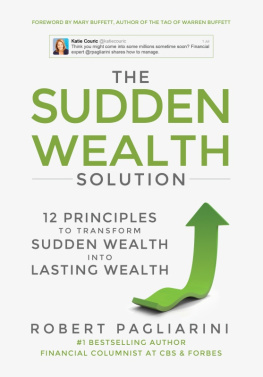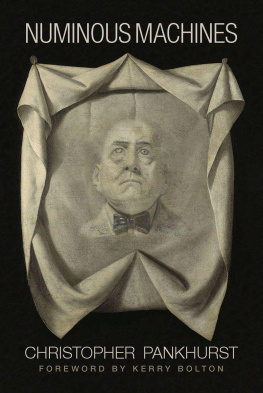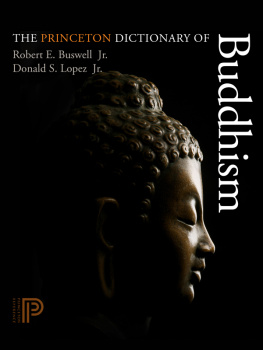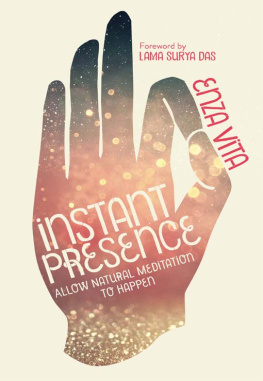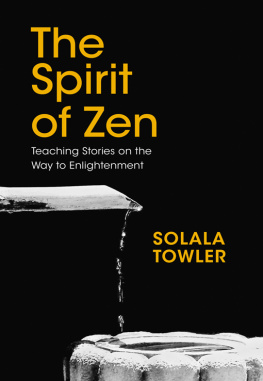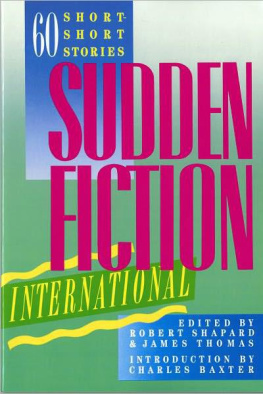Numinous Awareness
Is Never Dark
The Korean Buddhist Master Chinuls
Excerpts on Zen Practice
translated, annotated, and with an introduction by
Robert E. Buswell, Jr.
Copyright
2016 The Regents of the University of California
All rights reserved
Printed in the United States of America
21 20 19 18 17 16 6 5 4 3 2 1
ISBN 978-0-8248-6739-3 (cloth)
A record of the Cataloging-in-Publication data can be found at the Library of Congress Web
site: http://catalog.loc.gov/
Korean Classics Library: Philosophy and Religion
Series Editor: Robert Buswell, University of California, Los Angeles
Series Editorial Board:
Donald Baker, University of British Columbia
John Duncan, University of California, Los Angeles
Sun Joo Kim, Harvard University
Namhee Lee, University of California, Los Angeles
Jay Lewis, Oxford University
Charles Muller, Tokyo University
Young-chan Ro, George Mason University
Ken Robinson, International Christian University, Tokyo
Edward Shultz, University of Hawaii, Mnoa
Senior Editor: Jennifer Jung-Kim, University of California, Los Angeles
This work was supported by the English Translation of 100 Korean Classics program through the Ministry of Education of the Republic of Korea and the Korean Studies Promotion Service of the Academy of Korean Studies (AKS-2007-AA-2002).
University of Hawaii Press books are printed on acid-free paper and meet the guidelines for permanence and durability of the Council on Library Resources.
Design and composition by Wanda China
To my hearts , C. L. B., who helps me focus on whats important, not just necessary.
Contents
Preface
This book is a complete reworking of Chinuls masterwork, a translation of which I started back in the mid-1970s and which eventually appeared in my first book, The Korean Approach to Zen: The Collected Works of Chinul (1983). After that book went out of print a few years later, I prepared a paperback abridgment of the material that would be better suited to classroom use. The result was Tracing Back the Radiance: Chinuls Korean Way of Zen (1991). The selections I included from Chinuls Excerpts in that abridgment were just enough to give a small taste of its rich material. The full text of this important work has remained out of print for more than three decades now.
When the Chogye Order asked me in 2008 to prepare a new translation of Chinuls writings for the English edition of the Collected Works of Korean Buddhism series, I was asked to duplicate the contents of the Korean version of the collection and so reworked only Chinuls shorter works. Chinuls Excerpts was much too long to include in that collection, but it played such a central role in the mature tradition of Korean Buddhism that a new, entirely updated translation of Chinuls magnum opus seemed to me warranted as well. Starting the Korean Classics Library project, administered by the Center for Buddhist Studies at the University of California, Los Angeles, finally gave me the opportunity to return to this text. Although Chinuls Excerpts was not included on the original list of one hundred classics of the Korean tradition proposed for translation by the Academy of Korean Studies, I argued for its stature as the single most influential text ever written in the Korean Buddhist tradition and eminently deserving of inclusion in this series. I was therefore delighted that the Academy consented to add this work to its updated list of titles. Thanks to the Korean Classics Library project, I have finally been able to prepare a complete, fully revised, and exhaustively annotated translation of the full text of Chinuls Excerpts, which includes also extensive interpretive material drawn from two Chosn-dynasty commentaries. Preparing this new translation has also given me an opportunity to write an extensive new introduction that focuses exclusively on Chinuls magnum opus, its analysis of the Sudden/Gradual Issue in East Asian Buddhist thought, and the texts broader impact on the Korean Buddhist tradition. This work has helped me to clarify some of my earlier work on Chinul and this text, which I have published over the intervening decades in different venues in both Korea and the West; I have adapted some of that earlier material here.
This publication project is sponsored by the English Translation of 100 Korean Classics program, supported by the Ministry of Education of the Republic of Korea and the Korean Studies Promotion Service of the Academy of Korean Studies (AKS-2007-AA-2002). This sponsorship is greatly appreciated. I am also grateful to the UCLA Center for Buddhist Studies and the Irving and Jean Stone Endowed Chair in Humanities for subventions to help defray the cost of publication.
Chinuls Excerpts is especially important in the context of the Fourfold Collection (Sajip), the core of the traditional Korean monastic curriculum on Sn training. (I discuss in my translators introduction the pivotal role the Excerpts plays in that curriculum.) I am still pursuing a larger project to translate the entire Sajip collection into English. I remain grateful for the encouragement that I and a couple of close colleagues received to pursue that project from the Hanmam Snwn and its late founder, Taehaeng (Daehaeng) Knsnim, along with the Snwns adherents Hyegn Snim, Chngwl Snim, and especially Song Migyeong Posallim and Song Misook Posallim.
I am profoundly grateful to many people in both Korea and the United States who have inspired me to continue with my studies of Chinul. Ven. Hynho snim, the former abbot of Songgwangsa and a cofounder of the Pojo Sasang Ynguwn (and the monk who met me at Kimpo Airport when I first arrived in Korea from Southeast Asia in 1974), has always been the epitome of Buddhist compassion and the embodiment of the accommodating attitude toward both Sn practice and Kyo doctrine that Chinul forged in Korea. He is also a superb photographer and generously provided the color portrait of Chinul that is the frontispiece of this book. My wife, Christina Lee Buswell, herself a long-time adept of Korean Buddhism, has unfailingly encouraged me in my research on Chinul and in my own personal practice and has otherwise been a supportive presence in all aspects of our life together. I am keenly aware that she always has my welfare at heart, even when Mr. No, Yes may initially seem to resist the reminders. Patricia Crosby recognized the significance of the Korean Classics Library series when she was senior acquisitions editor at the University of Hawaii Press. We are extremely fortunate that she has yet to read the manual on retirement and has consented to serve as the series in-house copy editor; her punctilious editorial sense has spared me from many an egregious error both here and in previous books. Pat deserves a medal or two for everything she has done over the decades to encourage rigorous scholarly publications in both Buddhist and Korean studies; all I am able to offer here is my own heartfelt thanks and a deep bow. I am also grateful to the two anonymous readers who reviewed the manuscript for the series and offered copious comments on my introduction and translation, which were valuable in helping me hone my treatment. Peter Gregory graciously allowed me to consult him repeatedly about the nuances of Zongmis

